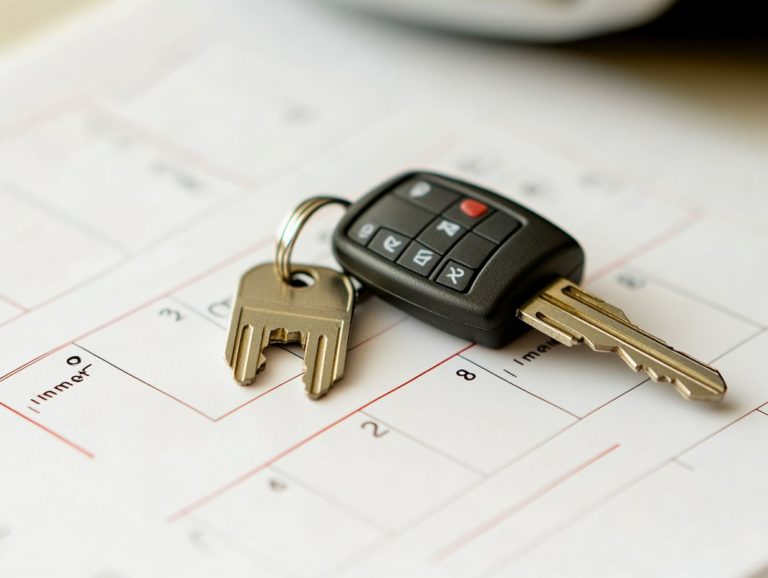Do I Need Auto Insurance for a Leased Car?
Leasing a car can be an exhilarating journey, but it brings its own set of considerations, especially regarding auto insurance. Understanding how to insure a leased vehicle is vital for your financial security and peace of mind.
From comprehending what leasing a car truly entails to exploring the different types of coverage you may require, this article will expertly guide you through the essential aspects of auto insurance for leased vehicles.
Whether you re stepping into the leasing world for the first time or seeking to refresh your knowledge, you ll discover valuable insights to help you select the right coverage tailored to your needs.
Contents
Key Takeaways:

- It is important to have auto insurance for a leased car to protect yourself and your vehicle.
- There are different types of coverage to consider for a leased car, such as liability, collision, and comprehensive.
- When choosing insurance for a leased car, consider the lease agreement requirements and your personal driving habits and needs.
Understanding Auto Insurance for Leased Cars
Understanding auto insurance for leased cars is essential for compliance with state requirements and safeguarding your financial interests. If you’re considering renting a vehicle, you might also want to know do you need insurance for a rental car? Leasing a vehicle typically entails specific insurance coverage mandates from the leasing company. These requirements protect the car itself and ensure you meet your legal obligations.
Familiarize yourself with various coverage options, such as collision coverage, comprehensive coverage, and liability coverage. This knowledge will help you navigate the complexities of leasing a car.
What is a Leased Car?
A leased car is a vehicle financed through a leasing company, allowing you to drive it for a specified period without the burdens of ownership, like depreciation or the hassle of resale.
Think of leasing as a form of renting. You pay a monthly fee to enjoy the vehicle, typically for two to four years. This arrangement usually comes with a set mileage limit, and exceeding that could incur extra fees.
At the end of the lease, you have the option to purchase the car at a predetermined price or return it to the leasing company. This flexibility makes leasing a convenient choice. Financial institutions provide necessary funding and offer various terms suited to different lessees.
This approach can make leasing a more manageable option for those who prefer not to commit to long-term financial obligations associated with outright car purchases.
Benefits of Having Auto Insurance for a Leased Car
Having auto insurance for your leased car is not just a good idea; you must have it! It safeguards your financial well-being by covering potential costs linked to accidents, theft, and unforeseen events. If you’re unsure about your policy, consider whether different coverage for leasing is necessary to ensure you’re fully protected.
Without sufficient coverage, you could face hefty out-of-pocket expenses, especially if your leased vehicle incurs damage or is deemed a total loss. Many leasing companies mandate specific insurance policies to protect their interests, making compliance imperative for your peace of mind.
Protection for You and Your Vehicle
Auto insurance serves as a crucial safeguard for you and your vehicle, protecting you against financial liabilities from accidents and damages.
Without the right coverage, a single incident could lead to significant out-of-pocket expenses, quickly straining your finances. Collision insurance covers damage to your leased vehicle from accidents, ensuring that repair costs are managed, regardless of fault.
Comprehensive insurance protects against various challenges, including theft, vandalism, or weather-related damages. Together, these coverage types minimize disruption and financial stress, allowing you to focus on the road ahead without worry about potential mishaps.
It’s crucial to compare insurance quotes or speak with an insurance agent for personalized advice. Protect your finances!
Types of Auto Insurance Coverage for Leased Cars

Grasping the various types of auto insurance coverage for leased cars is crucial for making informed choices that meet your needs and the leasing company’s requirements.
Liability Coverage
Liability coverage is an essential aspect of auto insurance, designed to protect you financially if you injure someone or damage their property while driving your leased vehicle.
Grasping the nuances of liability coverage is particularly important for those behind the wheel of leased vehicles.
It primarily includes two key components: bodily injury liability and property damage liability. Bodily injury liability offers you financial protection against claims that may arise for medical expenses, lost wages, and the pain and suffering of others due to an accident you caused.
Conversely, property damage liability takes care of the costs associated with repairing or replacing someone else’s property damaged by your actions.
It s crucial for you to familiarize yourself with state mandates regarding minimum liability requirements. These laws ensure you stay compliant and align with the insurance guidelines set forth by leasing companies, protecting both you and the lessor from unforeseen financial burdens.
Collision Coverage
Collision coverage is a crucial component of your auto insurance that helps cover repair costs for your leased vehicle in the event of an accident, no matter who is at fault.
This coverage helps pay for damage to your car from hitting other cars or objects, allowing you to return to the road without facing a significant financial strain.
Consider the deductible amounts, which show how much you need to pay out-of-pocket before insurance kicks in.
Know the coverage limits, as they determine how much your insurer will pay after you meet your deductible. If you re driving a leased vehicle, having collision coverage becomes particularly important since leasing agreements often mandate it to protect the vehicle s value.
Comprehensive Coverage
Comprehensive coverage is your safety net for a leased car, protecting you against non-collision incidents like theft, vandalism, and weather-related damage. It s a must-have for your insurance policy!
This type of coverage goes above and beyond basic liability insurance, offering you peace of mind by addressing a broader spectrum of potential risks you might encounter.
For instance, if an unexpected natural disaster occurs, having extensive coverage will ease the financial strain of repairs or replacements.
Leasing companies often mandate additional coverage options, such as gap insurance, to ensure that you re fully protected. Ultimately, this level of protection secures your vehicle and enhances your overall confidence on the road.
Factors to Consider when Choosing Auto Insurance for a Leased Car
When selecting auto insurance for a leased vehicle, you’ll need to consider several key factors. These include the specific requirements outlined by the leasing company, your driving history, and the potential costs associated with your insurance policy.
Each of these elements plays a crucial role in ensuring you meet your leasing obligations and secure the right coverage for your needs.
Lease Agreement Requirements

Understanding lease agreement requirements is crucial when choosing auto insurance for your leased vehicle. These requirements often dictate the minimum coverage levels needed.
Lease companies set these guidelines to protect their assets. They ensure their investment is secure in case of an accident or theft. Most leasing agreements will require you to carry comprehensive and collision coverage with specific limits, varying based on the vehicle’s value.
If you fail to meet these coverage requirements, you could face financial penalties or be responsible for covering the full cost of damages. If your insurance falls short, the lessor may purchase a policy for you at a significantly higher rate.
Grasping and adhering to these terms is essential for maintaining a good standing throughout your lease.
Personal Driving Habits and Needs
Your personal driving habits play a crucial role in determining the type of auto insurance for your leased vehicle. Understanding your habits helps guide you towards the best coverage options and potential discounts.
If you’re frequently navigating urban traffic, you might want to opt for more comprehensive coverage due to the higher risk of accidents. Conversely, if your vehicle sees mainly leisurely drives, a lower level of coverage may suffice.
Maintaining a clean driving record with minimal claims can lead to lower premiums. This showcases an opportunity for significant savings. Obtain insurance quotes that reflect your driving behaviors; many insurers offer discounts for safe drivers.
By understanding these nuances, you can secure a policy that aligns with your needs and reaps financial rewards.
How to Get Auto Insurance for a Leased Car
To get auto insurance for your leased vehicle, start by understanding your options. Shop around for quotes and compare various policies to find the best fit.
Consulting with a local agent provides personalized customer service, ensuring your unique needs are met with expertise and attention.
Shopping for Quotes and Comparing Policies
Shopping for quotes and comparing policies is essential in finding the right auto insurance for your leased car.
In today s competitive market, exploring various insurance providers like Progressive can help you find the right coverage. Each provider has unique features, discounts, and terms that impact your premium and overall protection.
By weighing the prices and benefits of different policies, you can pinpoint options that fit your budget and specific vehicle needs. Understanding how each plan addresses key aspects, such as liability limits (the maximum amount your insurance will pay for damages you cause to others), collision coverage, and comprehensive options, enables informed choices.
A thorough comparison leads to peace of mind and significant savings on your auto insurance.
Understanding Insurance Requirements for Leased Cars
Understanding the insurance requirements for leased cars is essential for both following the rules and financial security. These requirements can vary significantly from one state to another and among different leasing companies.
As a lessee, it s crucial to dive into the specific regulations to protect yourself. Failing to do so can lead to gaps in protection or unexpected financial burdens.
State laws outline the minimum liability coverage you must maintain. However, this may not always meet the demands set by leasing companies, which often require higher coverage limits and additional protections, such as comprehensive and collision coverage, to safeguard their assets.
Don t wait! Neglecting these requirements can lead to serious penalties or financial setbacks. This underscores the importance of conducting thorough research and understanding both local statutes and leasing terms.
Frequently Asked Questions

-
Do I Need Auto Insurance for a Leased Car?
Yes, you are required to have auto insurance for a leased car.
-
What type of insurance do I need for a leased car?
You will need liability insurance, as well as collision and comprehensive coverage.
-
Can I use my existing auto insurance for a leased car?
It depends on your current insurance policy. You may need to make adjustments or add coverage to meet the requirements for a leased car.
-
Do I need gap insurance for a leased car?
Yes, gap insurance is highly recommended for a leased car to cover the difference between the car’s value and the remaining lease payments in case of an accident or total loss.
-
Will the dealership provide auto insurance for a leased car?
No, the dealership does not provide insurance for a leased car. You will need to purchase a separate auto insurance policy.
-
How much will auto insurance for a leased car cost?
The cost of insurance for a leased car will vary depending on factors such as your driving record, the type of coverage you select, and the value of the car. It is best to get quotes from different insurance companies to find the best rate.
Now that you know the essentials, don t hesitate to shop around for the best insurance coverage for your leased car!






